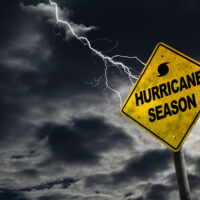How to Buy Hurricane Insurance

With climate change expected to increase the number and severity of hurricanes, now is a great time to buy insurance for your home to cover hurricane damage. However, getting covered is not always that simple, and we’ve spoken to many consumers who express confusion about what they should purchase. “What’s windstorm insurance?” they ask, or “what is a good deductible?” Below, we run through the basics of getting your home covered for a hurricane.
Check What Your Homeowner’s Insurance Covers
Your basic homeowners’ insurance should cover damage to the property. However, homeowners’ will not cover flood damage, and flooding is a huge problem with hurricanes. Instead, homeowners who want flood coverage need to buy a policy through the National Flood Insurance Program. Your insurance agent can usually get a policy and bundle it with a standard homeowner’s policy, but you need to be aware it is distinct. It can cost around $400 for $100,000 of coverage, though the amount varies.
Also make sure that you have windstorm coverage. This will cover damage caused by a hurricane’s high winds. Under Fla. Stat. § 627.712, any residential property policy must include windstorm coverage.
Understand Deductibles
You probably know what a deductible is already. If not, it basically is the amount of loss that isn’t covered by insurance. This means if your deductible is $1,000, you’ll be responsible for $1,000 of damage before your insurer covers anything.
Florida, like other coastal states, lets insurance companies charge a special deductible for hurricane damage. You should be aware of this fact when shopping for a policy. Also check the amount of the deductible. The higher the deductible, the lower your monthly premiums should be; but this is a tradeoff. If a hurricane strikes, you might wish you had a lower deductible.
Florida insurers should have different options for deductibles, such as $500 or 2%, 5%, or 10% of the home’s value. Compare prices to determine which deductible to get.
Check the Insurer’s Reputation
Not all insurers are the same. Some are more established than others, and some might go out of business once a hurricane hits. To check an insurer’s reputation, look at the Better Business Bureau. You can also check with the State’s Department of Insurance to make sure that they are properly licensed. A general Google search can also pull up general reviews, though those with complaints might have more motivation to complain.
Buy from the State Fund, if Necessary
Not everyone can get coverage on the open market, and Florida recognizes this fact. The state has helpfully created the Citizens Property Insurance Corporation that can provide coverage to those who cannot get a policy on the private insurance market. The Corporation is one of the largest property insurers in the state, with over 1 million people having an insurance policy with them.
Don’t Forget Your Car
A hurricane can damage or outright destroy a vehicle, which might be worth a considerable amount of money. You can get a comprehensive insurance policy, which will cover damage caused by a hurricane.
If you need help with an insurance claim, contact the Daytona Beach hurricane insurance claims attorneys at Bundza & Rodriguez. If you call 386-252-5170, you can meet for a consultation with one of our Daytona Beach attorneys.
